“After menopause, you may be more likely to develop
risk factors for heart disease, including:
high blood pressure, an increase in total cholesterol…”.1
Umbrella
What may the Heart Disease and Women’s Risk Factors Umbrella include?
Depending on the Source (DotS) this Umbrella may include:
- Cardiovascular Disease (CVD
- Coronary Artery Disease (CAD)
- Coronary Heart Disease (CHD)
- Heart Conditions
- Heart Disease Risk Factors
- Heart Disease/s
Heart Disease
What is heart disease?
DotS the definition of heart disease may vary. The (United States) Centers for Disease Control and Prevention’s definition is:
“The term “heart disease” refers to several types of heart conditions. The most common type of heart disease in the United States is coronary artery disease (CAD). CAD affects the blood flow to the heart. Decreased blood flow can cause a heart attack”.2
Risk Factors
What are heart disease risk factors?
DotS the definition of heart disease risk factors may vary. In Heart Health Living: Understand Your Risk for Heart Disease the (United States) National Heart, Lung, and Blood Institute’s (NHLBI) definition is:
“Risk factors are conditions or habits that make a person more likely to develop a disease. These risk factors may be different for each person”.3
Heart Disease Risk Factors
What are heart disease risk factors?
In Coronary Heart Disease: Risk Factors the NHLBI elaborate on:
- “Age…
- Environmental and work conditions…
- Family history and genetics…
- Lifestyle habits…
- Heart and blood vessel diseases
- Other medical conditions…
- Race or ethnicity…
- Mental health and social factors…
- Sex…”.4
Age
For women, when does age become a risk factor for heart disease?
In Keep Your Heart Healthy: The Basics: Overview – Am I At Risk for Heart Disease? the (United States) Healthfinder.gov note:
- You’re a woman over age 55
- You’re a man over age 45
- Your father or brother had heart disease before age 55
- Your mother or sister had heart disease before age 65”.5
Family History
Is there an association between family history and heart disease?
Yes. In Family History the British Heart Foundation elaborate on:
“If you have a family history of heart or circulatory disease, you might have a higher risk of developing conditions that can lead to a heart attack or stroke”.6
Diabetes
Is there an association between diabetes and heart disease?
Yes. In Diabetes, Heart Disease, and Stroke the (United States) National Institute of Diabetes and Digestive and Kidney Diseases explain:
“Having diabetes means you are more likely to develop heart disease. People with diabetes are also more likely to have certain risk factors, such as high blood pressure or high cholesterol, that increase their chances of having a heart attack or a stroke”.7
Menopause
 Is there an association between menopause and heart disease?
Is there an association between menopause and heart disease?
In What Is Menopause? Perimenopause, Menopause and Postmenopause – Postmenopause: Heart Health the (Australian) Jean Hailes for Women’s Health note:
“Before menopause, women have a lower risk of heart disease than men. But, as women age and their oestrogen levels fall, their risk of heart disease increases. Heart disease is one of the leading causes of death for women in Australia. Heart disease also claims 3 times as many lives as breast cancer”.8
After Menopause
Is there an association between after menopause and heart disease risk factors?
The JH explain:
- High blood pressure
- An increase in total cholesterol
- An increase in LDL (‘bad’ cholesterol)
- A decrease in HDL (‘good’ cholesterol)
- An increase in blood fats, such as triglycerides”.9
Prevention
How may heart disease be prevented?
In Coronary Heart Disease: Causes and Prevention – How Can You Prevent Coronary Heart Disease? the NHLBI elaborate on:
Health Care Provider
What is it important for women to keep in mind about heart disease risk?
In Heart Disease: It’s Not Just for Men – You and Your Doctor: A Heart Healthy Partnership the NHLBI remind us:
Health Topics A-Z
Where may I find Health Topics A-Z related to Heart Disease and Women’s Risk Factors?
In Health Topics A-Z you may find:
Links
Where may I find Links related to Heart Disease and Women’s Risk Factors?
Your Country may have Links similar to:
Links
This Links List to third party websites is neither comprehensive nor exhaustive. Inclusion on this Links List does not imply endorsement or recommendation. Non-inclusion on this Links List does not imply non-endorsement or non-recommendation. Third party websites are not under the control of Meno Martha International Menopause Directory. Third party websites may contain explicit medical images and/or sexual references. Please read Meno Martha International Menopause Directory’s Links Policy before proceeding to a Link. Please contact Webmaster if you experience a problem with a Link.New or Updated
- Be A Force for Change. Know the Signs. Get Your Heart Checked. [Video]
- Consumer Video and Podcast Series: 2025 Consumer Videos and Podcasts – Nutrition At Menopause and Why It Is Important [12 February 2025]
- Dash Eating Plan [10 January 2025]
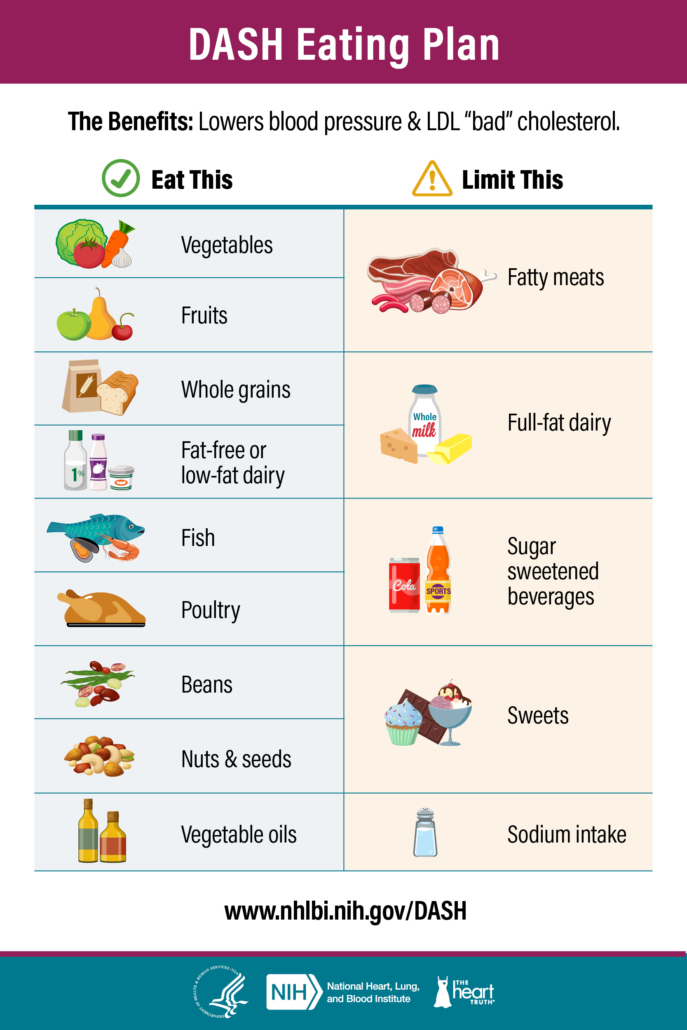
- Heart Disease Risks In Women Often Rise During the Years Right Before Menopause [22 November 2024]
- Heart To Heart: A Chat About Heart Disease Risk In Women [March 2024]
- Webinars: Previous – Recommendations on Cardiovascular Risk Assessment [19 November 2024]
- About Heart Disease In Women
- Alcohol
- Are You At Risk of Heart Disease?
- Askearlymenopause.org [Ask EM] [+ Video: What Is Early Menopause?]
- BMS TV: Coronary Heart Disease (CHD)
- Be A Force for Change. Know the Signs. Get Your Heart Checked. [Video]
- Cardiovascular Diseases (CVDs)
- Causes and Prevention of Heart Disease
- Consumer Video and Podcast Series: 2023 Consumer Videos and Podcasts – Menopause and Heart Disease
- Coronary Heart Disease
- Dash Eating Plan

- DASH Eating Plan
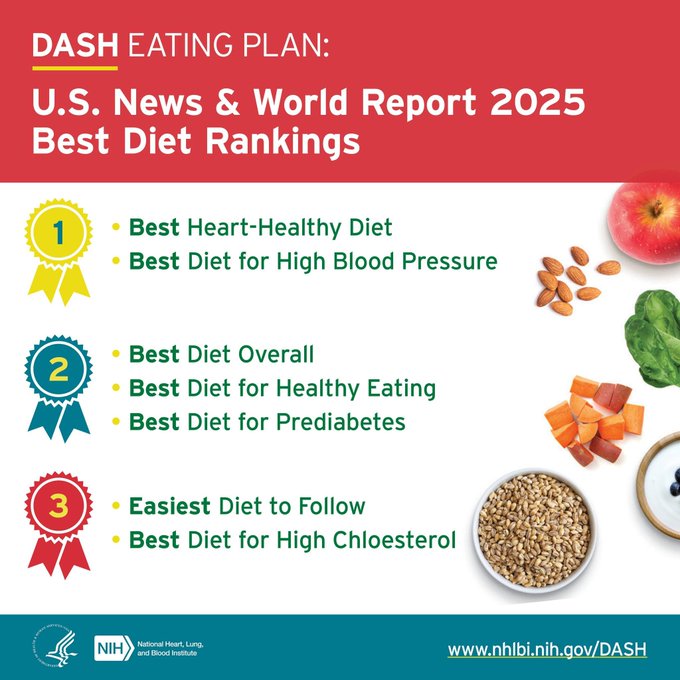
- Diabetes: Your Heart and Diabetes
- Doing These 8 Things May Greatly Lower Risk for Heart Disease and Stroke
- Early Menopause: Women’s Experiences – Resources and Information: Quick Links – 1. Question Prompt List
- Family History
- Getting Serious About Heart Health: Risk Factors for Cholesterol
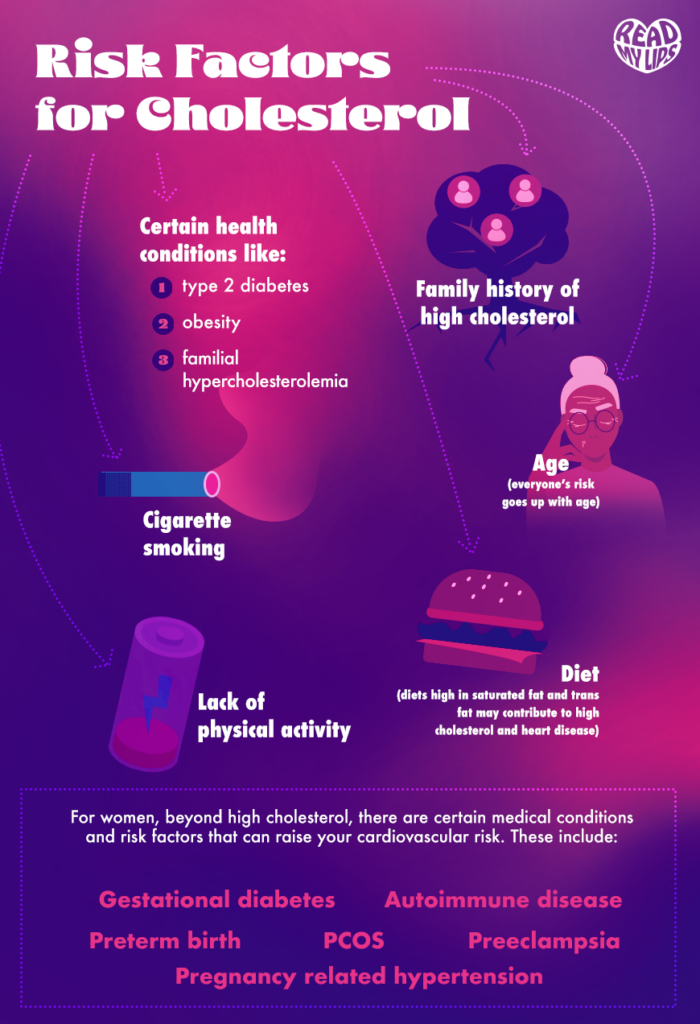
- Goredforwomen.org [Go Red for Women, United States]
- Guidance on Menopausal Hormone Therapy
- Healthy Eating To Protect Your Heart
- Healthy Lifestyle
- Healthy Living
- Heart Disease
- Heart Disease In Black Women: The Big Issue You Might Not Know About
- Heart Disease In Hispanic Women
- Heart Disease In Women: Understand Symptoms and Risk Factors
- Heart Disease Risk Factors You Can Control: Behaviors
- Heart Disease Risks In Women Often Rise During the Years Right Before Menopause
- Heart Disease and Stroke In Black Women
- Heart Disease and Women
- Heart Disease, Family Health History, and Familial Hypercholesterolemia: Family Health History and Heart Disease
- Heart Disease: About Sleep and Your Heart Health
- Heart Disease: About Women and Heart Disease
- Heart Disease: Heart Disease Risk Factors
- Heart Disease: It’s Not Just for Men – Questions To Ask Your Doctor
- Heart Disease: Preventing Heart Disease
- Heart Diseases – Multiply Languages
- Heart Health Information In Your Language: Smoking and Your Heart Health
- Heart Health Information In Your Language: Women and Heart Disease
- Heart Health for Women [Multiply Languages]
- Heart Health: What Women Need To Know
- Heart To Heart: A Chat About Heart Disease Risk In Women [Video]
- Heart-Healthy Living
- Heart-Healthy Living: Understand Your Risk for Heart Disease
- Heart-To-Heart: Talking To Your Health Care Professional
- High Blood Pressure and Women
- Hormone Therapy: Is It Right for You?
- Hot Flashes: What Can I Do? [+ Video: What Are the Signs and Symptoms of Menopause?]
- How To Make Healthy Food and Healthy Lifestyle Choices Now
- How To Prevent Heart Disease After Menopause
- Ischemic Heart Disease
- Know Your Numbers They Could Just Save Your Life
- Know Your Risk
- Later Years (Around 50 Years and Over): Menopause and Post Menopause Health – Hormone Replacement Therapy (HRT) [+ Video: Is HRT Bad for You?]
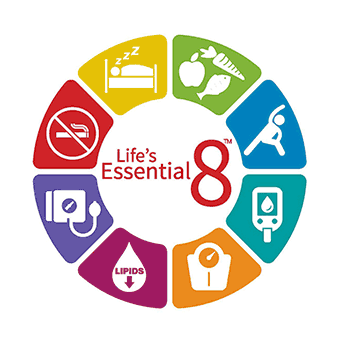 Life’s Essential 8
Life’s Essential 8- Listen To Your Heart: Women and Heart Disease
- Mayo Clinic Minute: Are You Getting Enough Sleep for Your Best Heart Health? [+ Video Courtesy: Mayo Clinic News Network]
- Mayo Clinic Minute: Menopause and the Heart Connection [+ Video Courtesy: Mayo Clinic News Network]
- Mayo Clinic Minute: Signs of Coronary Artery Disease, How To Reduce Your Risk [+ Video Courtesy: Mayo Clinic News Network]
- Mayo Clinic Minute: What Is Heart Disease? [+ Video Courtesy: Mayo Clinic News Network]
- Mayo Clinic Q&A Podcast: Don’t Miss A Beat With Preventive Heart Care [+ Video Courtesy: Mayo Clinic News Network]
- Menopause Patient Information: 3. The Risks & Benefits of HRT
- Menopause Patient Information [Videos] 5. Lifestyle Advice In Menopause & Perimenopause
- Menopause Preparedness Toolkit Video Series: Common Conditions Associated With Menopause and Midlife
- Menopause Preparedness Toolkit: A Woman’s Empowerment Guide
- Menopause and Cardiovascular Risk
- Menopause and Heart Disease
- Menopause and Heart Disease
- Menopause and Your Heart
- Millionhearts.hhs.org
- National Center for Complementary and Integrative Health: Cardiovascular Disease
- National Center for Complementary and Integrative Health: Chelation for Coronary Heart Disease: What You Need To Know
- Preventing Cardiovascular Disease
- Risk Factors
- Sleep
- Sleep Joins Revamped List of Heart Health Essentials
- Smokefreewomen [United States]
- Smoking
- Stress and Heart Health
- Taking It To Heart: Addressing Cardiovascular Disease In Women
- The Connection Between Menopause and Cardiovascular Disease Risks
- The Facts About Women and Heart Disease
- The Heart Truth
- Tips To Keep Stress From Hurting Your Heart
- Tips for Women To Prevent Heart Disease
- Videos & Podcasts: Videos – Cardiovascular Disease In Women
- Videos and Podcasts: Videos – Heart Disease, Risk Factors of Developing Heart Disease, and Can I Take Hormones?
- WISEWOMAN
- Webinars: Previous – Cardiovascular Disease
- Webinars: Previous – Recommendations on Cardiovascular Risk Assessment
- World Heart Day [29 September]
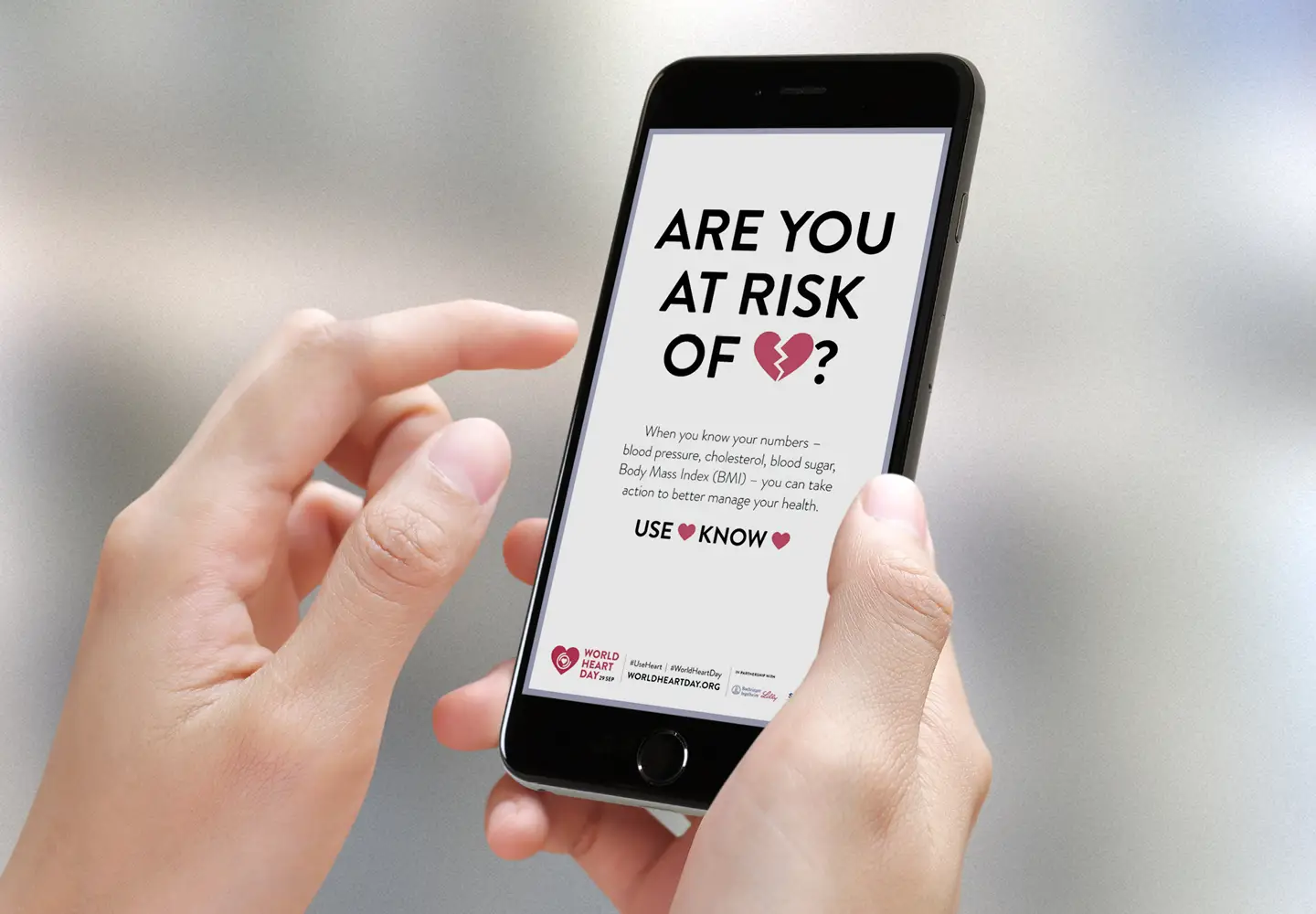
- Womensheart.org [WomenHeart, The National Coalition for Women With Heart Disease, United States]
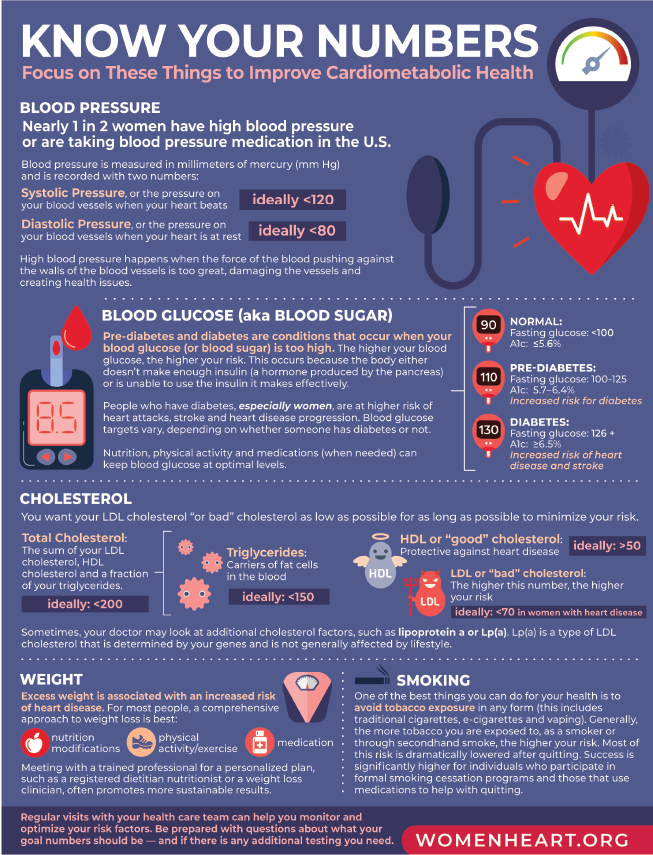
- Women’s Wellness: Understand Heart Disease Symptoms and Risk Factors Unique To Women
- World Menopause Day

- World Menopause Day: Patient Information Leaflet – Cardiovascular Disease: What Women Need To Know [Multiply Languages]
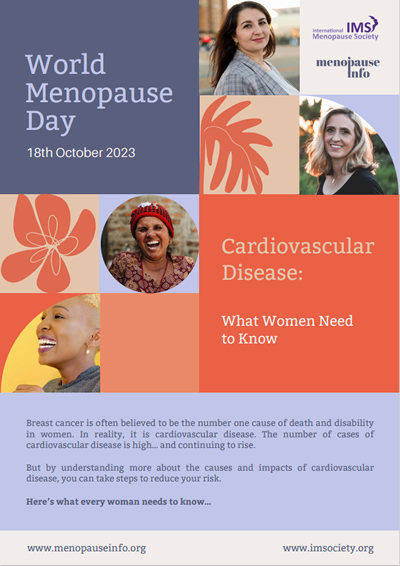
- You Can Prevent Heart Disease. Yes, YOU!
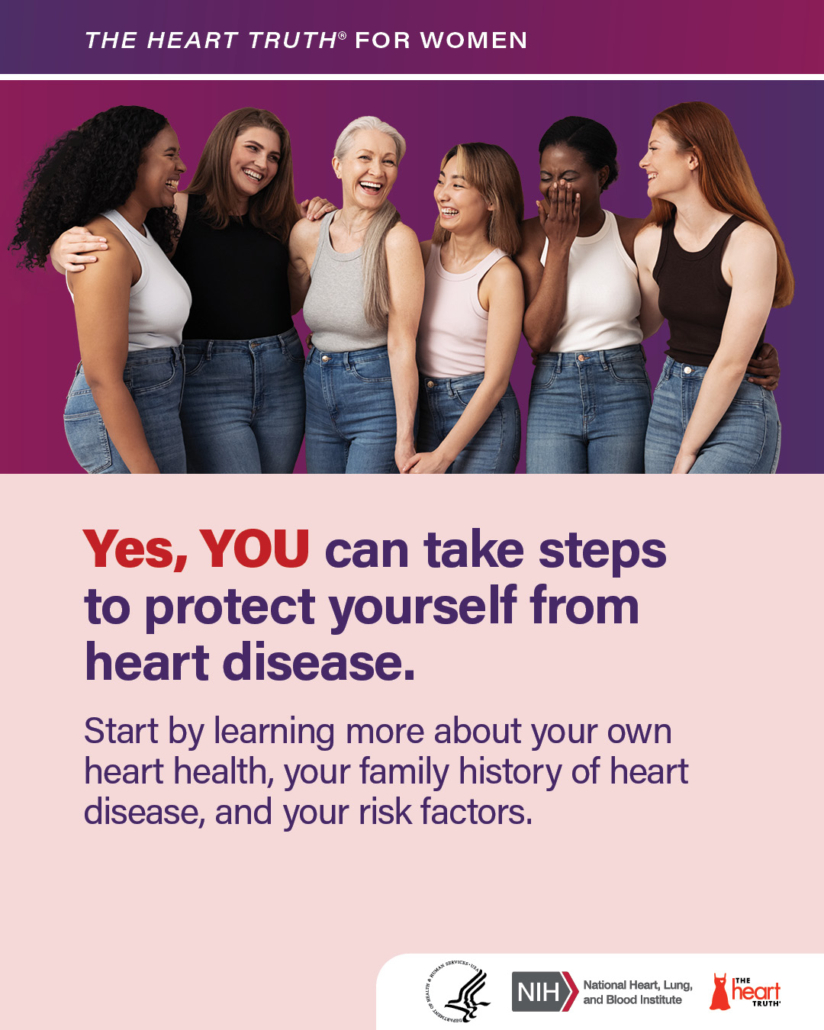
- Yourethecure.org
Sources
Where may I find the Sources quoted?
You may find the Sources quoted at:
Sources
- What Is Menopause? Perimenopause, Menopause and Postmenopause – Postmenopause: Heart Health After Menopause. Last Updated: 13 May 2025 | Last Reviewed: 22 April 2025. Jean Hailes for Women’s Health https://www.jeanhailes.org.au/health-a-z/menopause/about-menopause Accessed: 05 July 2025
- Heart Disease: About Heart Disease – What Is Heart Disease? 15 May 2024. Centers for Disease Control and Prevention https://www.cdc.gov/heart-disease/about/ Accessed: 05 July 2025
- Heart-Healthy Living: Understand Your Risk for Heart Disease. Last Updated: 24 March 2022. National Heart Lung, and Blood Institute https://www.nhlbi.nih.gov/health/heart-healthy-living/risks Accessed: 05 July 2025
- Coronary Heart Disease: Risk Factors. Last Updated: 27 December 2024. National Heart Lung, and Blood Institute https://www.nhlbi.nih.gov/health/coronary-heart-disease/risk-factors Accessed: 05 July 2025
- Keep Your Heart Healthy: The Basics: Overview – Am I At Risk for Heart Disease? Content Last Updated: 16 December 2024. Healthfinder.gov https://healthfinder.gov/HealthTopics/Category/health-conditions-and-diseases/heart-health/keep-your-heart-healthy Accessed: 05 July 2025
- Family History. Page Last Reviewed: December 2021. British Heart Foundation https://www.bhf.org.uk/heart-health/risk-factors/family-history Accessed: 05 July 2025
- Diabetes, Heart Disease, and Stroke. Last Reviewed: April 2021. National Institute of Diabetes and Digestive and Kidney Diseases https://www.niddk.nih.gov/health-information/diabetes/overview/preventing-problems/heart-disease-stroke Accessed: 05 July 2025
- What Is Menopause? Perimenopause, Menopause and Postmenopause – Postmenopause: Heart Health After Menopause. Last Updated: 13 May 2025 | Last Reviewed: 22 April 2025. Jean Hailes for Women’s Health https://www.jeanhailes.org.au/health-a-z/menopause/about-menopause Accessed: 05 July 2025
- What Is Menopause? Perimenopause, Menopause and Postmenopause – Postmenopause: Heart Health After Menopause. Last Updated: 13 May 2025 | Last Reviewed: 22 April 2025. Jean Hailes for Women’s Health https://www.jeanhailes.org.au/health-a-z/menopause/about-menopause Accessed: 05 July 2025
- Coronary Heart Disease: Causes and Prevention – How Can You Prevent Coronary Heart Disease? Last Updated: 27 December 2024. National Heart Lung, and Blood Institute https://www.nhlbi.nih.gov/health/coronary-heart-disease/causes Accessed: 05 July 2025
- Heart Disease: It’s Not Just for Men – You and Your Doctor: A Heart Healthy Partnership. National Heart Lung, and Blood Institute https://www.nhlbi.nih.gov/health-topics/education-and-awareness/heart-truth/heart-disease-not-just-men Accessed: 05 July 2025








